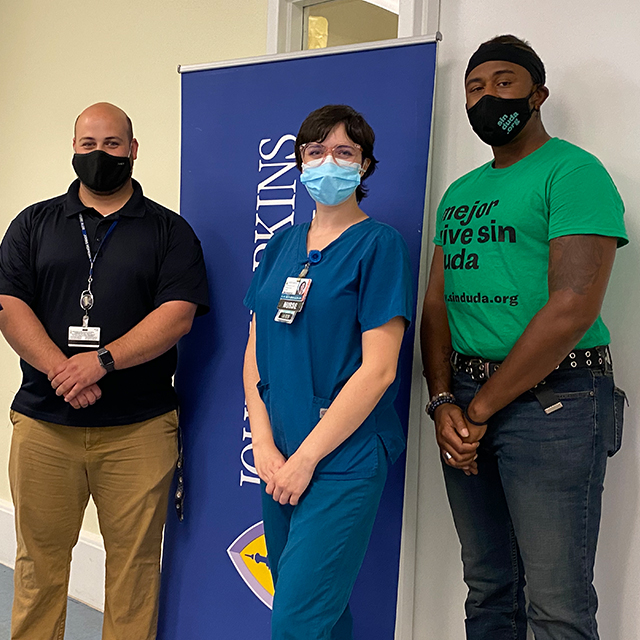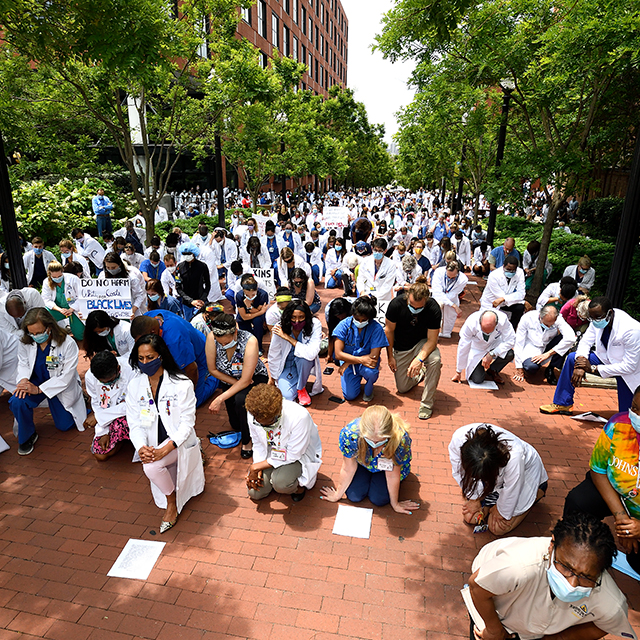In an hourlong presentation to faculty, staff members and learners, Theodore L. DeWeese, interim dean of the Johns Hopkins University School of Medicine and CEO of Johns Hopkins Medicine (JHM), delivered his first State of Johns Hopkins Medicine address Nov. 10 in the Turner Auditorium on the East Baltimore campus. The address was open for in-person attendance for the first time since 2019 — an estimated 125 people were there — and nearly 2,000 more watched live online.
Declaring Johns Hopkins Medicine is “strong and getting stronger,” DeWeese’s first speech to JHM’s workforce of 40,000 people highlighted organizational accomplishments from the past year, touching on many areas of the tripartite mission of research, education and patient care. In particular, he emphasized JHM’s increased support for the underserved communities its hospitals serve, its expansion of treatment facilities in the Washington, D.C., area, and discoveries in the burgeoning fields of precision medicine and precision biomedicine.
DeWeese devoted a significant part of his address to issues regarding diversity. Highlighting a new “equity statement” that JHM adopted, he emphasized that “everyone has a role to play in promoting diversity.”
“Our role as the world’s preeminent biomedical institution brings with it some major responsibility,” he said. “One of those responsibilities: Be a leader in the effort to reject discrimination of any kind and to celebrate the incredible diversity that’s on permanent display here at Hopkins.
“If we cannot provide equal opportunity to succeed for everyone who wants to be here, we have failed as an institution.”
A mentorship program named for the late Johns Hopkins cardiac surgeon and civil rights activist Levi Watkins Jr. is a point of pride for DeWeese. He said the program identifies and develops potential leaders among junior faculty, with a focus on underrepresented groups. DeWeese took part in the inaugural cohort last year, serving as a sponsor for associate professor of medicine Risha Irvin, who specializes in clinical care, research and community engagement involving HIV and hepatitis C.
“Dr. Watkins dedicated his life and his career to advocating for diversity and inclusion at Johns Hopkins and in the medical field overall,” DeWeese said. “He mentored countless physicians and other staff here at Johns Hopkins.”
Stressing that his address covered only a small sample of the year’s achievements, DeWeese spoke about a range of topics.
Research breakthroughs
DeWeese emphasized the importance of fundamental research that fuels advances in medicine.
“We need to be sure we have strong basic science,” he said. “Without it, we’re not Johns Hopkins.”
Clinical and translational research, he said, can’t happen without the building blocks that basic science provides.
Andrew Ewald, director of the cell biology department, and his team discovered biomarkers this year that differentiate “triple negative” breast cancer cells that spread to other parts of the body from those that stay in place. Accounting for 10% to 20% of all breast cancers, triple negative cancer occurs at a higher rate among African American women and has been especially hard to treat. DeWeese said Ewald’s research “found some critically important clues that, we hope, will lead to earlier detection and new treatments.”
Also this year, Jeremy Nathans, a professor of molecular biology and genetics, neuroscience and ophthalmology at the Johns Hopkins University School of Medicine, published research that found four new cell types in the iris — the flexible disc of tissue in the eye that constricts and dilates based on light conditions. Nathans and his research team also mapped the full catalog of genes in the newly discovered cells, and the proteins those genes express.
Patient care
DeWeese used prerecorded videos during his address to demonstrate the breadth of patient care at Johns Hopkins Medicine, with a Maryland infant cured of a serious heart problem at Johns Hopkins Children’s Center and Johns Hopkins All Children’s Hospital’s courageous response to Hurricane Ian as examples.
Dramatic increases in the use of telemedicine this year, DeWeese said, were key to expanding patient access to care and to maintaining referrals to the Johns Hopkins Health System. Since the beginning of the COVID-19 pandemic, JHM has completed nearly 1.6 million telemedicine visits.
The dean also lauded JHM’s continued expansion into the Washington area. “The health system has provided funding for dozens of new clinical faculty to help grow and support our clinical road map,” he said. “Just recently, we hired 29 new faculty members to expand specialty care in the National Capital Region.”
Community efforts
DeWeese discussed a program designed to reduce gun violence in neighborhoods that The Johns Hopkins Hospital serves.
“Here in East Baltimore, and in the rest of the city, we’re experiencing an epidemic that is taking lives almost daily,” said DeWeese. “Our emergency departments treat hundreds of victims of violence — particularly gun violence — each year. No one is better at treating those terrible injuries than the teams in our emergency departments. But what if we also intervened beyond direct health care? What if we tried to prevent some of those violent deaths and injuries from happening in the first place?”
The Johns Hopkins Hospital’s Break the Cycle program offers skilled peer counseling to victims of violence, with a focus on gun violence, as well as referrals for services to help them avoid dangerous or volatile situations.
“We’re trying to make sure that the victims don’t leave our hospital determined to victimize others,” DeWeese said.
Highlighting JHM efforts to reduce barriers to housing and employment, and to address other social determinants of health, the interim dean cited a series of JHM-hosted expungement clinics, where East Baltimoreans who have outdated legal or police records can apply for removal of information that is no longer relevant. This year alone, more than 400 Baltimoreans have filed for expungements at the Johns Hopkins clinics.
Financial health
The dean congratulated JHM’s development office for raising $427 million last year, second only to 2020’s $441 million.
“The development team’s work sometimes goes unheralded,” DeWeese said. “Without them, much of what we’re talking about today would not be possible.”
He provided several examples of why philanthropy — gifts from donors, charitable foundations and other private interests — is important, first highlighting financial aid and scholarships for medical students who couldn’t otherwise afford a Johns Hopkins medical education. From funding endowed professorships to programs that provide free eyeglasses for Baltimore children in need, DeWeese said philanthropy is crucial to progress at Johns Hopkins.
In addition to private philanthropic donations, DeWeese also celebrated the $1.09 billion in federal grants and contracts awarded to JHM last year for research. He said 2021 was the institution’s largest ever public funding year.
“The staggering amount and quality of research happening at Johns Hopkins is — all by itself — an inspiration,” the dean said. “The lifeblood of our scientific work is the faculty ideas that drive the grants and contracts, and our ability to successfully compete for them.”
DeWeese ended his address by thanking staff, faculty members and learners at Johns Hopkins Medicine for their dedication to excellence in patient care. He singled out one group: staff members in the departments of pediatric emergency medicine and pediatrics that are currently overflowing with patients who have the respiratory syncytial virus (RSV) and other respiratory conditions.
DeWeese was appointed to his interim roles by the Johns Hopkins Medicine board of trustees earlier this year, after the retirement of Paul B. Rothman. The founder and former director of Johns Hopkins’ Department of Radiation Oncology and Molecular Radiation Sciences, DeWeese has spent the bulk of his career on the East Baltimore medical campus, completing his residency at Johns Hopkins in 1994, followed by a laboratory research fellowship. He continues to treat patients and to publish extensively in cancer treatment research.




